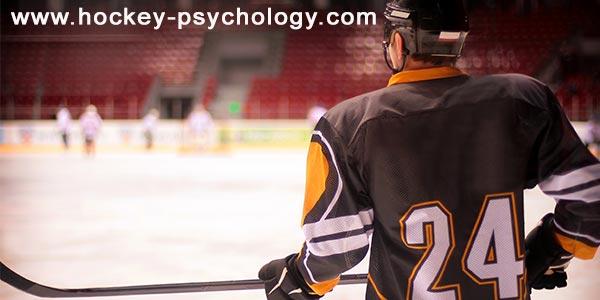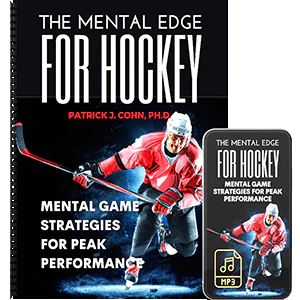
Focus on Your Talents, Not Others’
“Why can’t I play consistently from game to game or even shift to shift when it seems like all my teammates can do it without any problems or setbacks?”
This question was posed by a hockey player who responded to our hockey mental skills survey.
Watching your teammates play great hockey while seeing yourself struggle from game to game is not easy to mentally process.
It’s frustrating when you struggle on the ice. Your teammates seem to make the perfect pass while you have difficulty making easy passes.
In close games, your teammates seem to always make the right play but you feel you make mistakes when your team needs you most. You feel uneasy and tense on the ice.
On the bench between shifts, you are afraid to make further mistakes rand let your team down. You feel you are being judged and your heart is pounding.
You wonder why your teammates seem to always be on top of their games and you can’t even piece together two strong shifts of the ice.
On the surface, consistency appears to be the primary performance issue but comparing yourself to other players is the underlying problem.
Comparison to Others is Problematic on Several Levels:
Your view of other player’s performance is biased. When you compare yourself to others, you often compare yourself to the players playing flawlessly on the ice. You overlook all their errors while you amplify every little mistake you make during your time on the ice.
By comparing yourself to others, you will experience feelings of inferiority, “I’m not that good” or “I’m not as good as…” Needless to say, when you compare yourself to others, your confidence sinks.
Comparison creates the “need for perfection.” When you erroneously see your teammates as perfect, you will feel you need to be perfect. You start believing that being consistent means being perfect. Your focus becomes “I can’t make any mistakes.”
Comparison mode causes you either play it safe or press on the ice. Either approach greatly holds you back from playing solid hockey.
Comparison generates a great deal of anxiety. Anxiety contributes to even more mistakes and prevents you from playing consistently at a high level.
Comparison to others is a recipe for under-performance and increased mistakes on the ice. Consistency issues are a direct result of comparing yourself to your teammates or players on other teams.
Consistent hockey requires confidence… confidence in your abilities and confidence to be an asset to your team. It is impossible to be confident when you are a bundle of nerves during your shifts or on the bench between shifts.
The solution to your consistency issue is to stop using others as your
measuring stick. You have a specific role on your team. Focus on your game one shift at a time and let go of the ideal that consistency requires perfection.
I suggest that your focus on your unique talents and abilities, not what your think others have! If you are going to make comparisons, compare your performance to your performance from last week because the goal should be to improve each week.
Related Articles on Hockey Mental Game:
- How to Improve Team Confidence
- How Confidence Boosts Performance
- How Athletes Can Avoid the Comparison Trap
*Subscribe to The Sports Psychology Podcast on iTunes
*Subscribe to The Sports Psychology Podcast on Spotify
The Mental Edge for Hockey

The Mental Edge for Hockey teaches you proven and simple mental game strategies so you can overcome fear of failure, lack of confidence, slumps or poor composure, take your practice game to competition, and boost your confidence in hockey. You learn simple, actionable mental game strategies to help you perform at your peak!
I’ve worked with athletes for 30 plus years – and know the top challenges that undermine performance when you perform in games. Now you can tap into my expertise and experience in coaching hockey players on the mental game.
In this program, you’ll learn the TOP 10 mental training lessons for hockey players – the same strategies I teach one-on-one athletes I coach on the mental game. My clients pay thousands of dollars for personal coaching, but now you can have the same strategies to improve your mental game – at a fraction of the price.
Leave a Reply